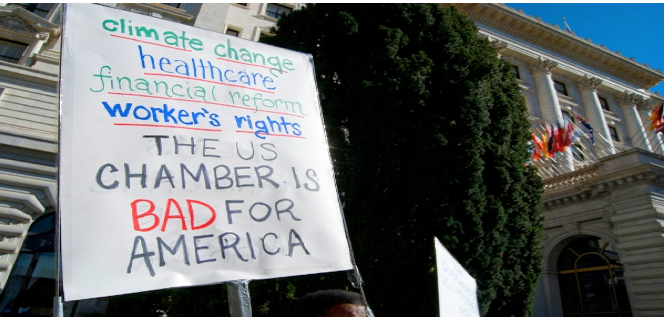CommentsWHAT YOU SEE, NOT WHAT YOU GET--Who does the biggest lobbying force in the United States represent? Not its members.
That's according to a new investigation (pdf) by a group of U.S. senators, which found that on the issues of tobacco use and climate change, there's a profound disparity between the U.S. Chamber of Commerce's positions and those of the companies it supposedly speaks for.
The investigation, which comes on the heels of leaked polling results showing how the group attempts to suppress the "empathy" of its members on pro-worker positions, is based on research and correspondence with 108 private sector members of the Chamber's Board of Directors.
Led by Senators Sheldon Whitehouse (D-R.I.) and Elizabeth Warren (D-Mass.), it was triggered by a series of 2015 New York Times articles exposing how the group was working to thwart global anti-smoking efforts and fight President Barack Obama's plan to limit power plant emissions of greenhouse gases.
The findings, the report states, "[call] into question the Chamber's allegedly transparent decision-making process, and [suggest] that the Chamber does not accurately represent the positions of its member companies." As noted in the report:
- Approximately half of the companies on the Chamber’s Board of Directors have adopted anti-tobacco and pro-climate positions that contrast sharply with the Chamber's activities.
- Not a single Board member explicitly supported the Chamber's lobbying efforts.
- Despite the Chamber's description of the Board as its "principal governing and policy-making body," not one Chamber Board member explicitly indicated that they were fully aware of and able to provide their input and views to the Chamber regarding its actions on tobacco and climate.
In fact, "We found a corporate America far more concerned about public health and the environment than the Chamber's efforts would suggest. We identified dozens of companies investing heavily to get their employees to stop smoking because they realize a healthy workforce is a productive one. We identified companies from all corners of the economy working to reduce their carbon footprints and affirmatively supporting the Obama Administration’s Clean Power Plan and its international efforts at the COP21 climate negotiations in Paris," the senators write in their cover letter to Chamber Board members accompanying the report.
Yet these members "undermine their own efforts by affiliating with an organization that actively and aggressively undermines efforts to reduce tobacco use and tries to prevent action to address climate change," the letter continues. "By lending tacit support to an organization that has spearheaded a decades-long effort against policies to address both problems, member companies become de facto promoters of tobacco and adversaries of climate action."
The letter goes on to urge the members to reflect upon "the effects in Congress of your continued affiliation with the Chamber on these issues."
Expounding on the influence the Chamber wields, Dan Dudis, director of Public Citizen's U.S. Chamber Watch Program, writes in an op-ed at The Hill this week:
While the Chamber is well known in Washington as a big-spending mouthpiece for Big Business, even seasoned observers of the D.C. political scene might be surprised at just how far and wide the Chamber has spread its tentacles.
Dudis also writes that it has a "central role [...] in corrupting our political system through more than $1 billion in lobbying and more than $100 million in election spending."
And that speaks to the campaign spending issues that followed the Supreme Court's Citizens United ruling. As Gretchen Goldman, lead analyst in the Center for Science and Democracy at Union of Concerned Scientists, wrote last year:
If its own board members aren't standing with the Chamber on climate change, who is? Who is supporting the Chamber's anti-science position on climate and other issues? And who is funding its work to undercut efforts to promote clean energy and reduce our emissions? We need greater transparency in our political system to hold accountable those blocking efforts to address climate change.
(Andrea Germanos writes for Common Dreams … where this piece was first posted.)
Sidebar

 CityWatch Los Angeles
Politics. Perspective. Participation.
CityWatch Los Angeles
Politics. Perspective. Participation.
19
Fri, Apr















